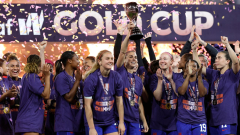-
Cesar Hernandez
Mar 11, 2024, 07: 32 AM ET
SAN DIEGO, Calif. — With the glimmer of a well-deserved Concacaf W Gold Cup trophy in the hands of the U.S. women’s national team, it’s easy to forget that just weeks ago, the journey into the inaugural tournament began with a statement of regret from team captain Lindsey Horan.
“First and foremost, I would like to apologize to our fans,” said Horan days before the start of the W Gold Cup. “Some of my comments were poorly expressed and there was a massive lesson learned for me.”
– Stream on ESPN+: LaLiga, Bundesliga, more (U.S.)
The issue? It all stemmed from an interview with The Athletic in which Horan stated: “American soccer fans, most of them aren’t smart … They don’t know the game. They don’t understand.” The context is key here, and as she went on to note in the February article, the Lyon midfielder seemed to want to highlight how the sport is understood at a higher level in France during her time abroad.
Had she worded things differently, it could have been seen as more of a fair point, but the timing couldn’t have been worse. Horan and her teammates were not only getting ready for a new tournament, but also looking to bounce back after their worst finish in a major competition, having exited the 2023 Women’s World Cup in the Round of 16. Shortly after Australia-New Zealand 2023, head coach Vlatko Andonovski resigned, leaving Twila Kilgore in charge as interim.
Whether a fairweather U.S. sports fan or a journalist, both likely arrived at the same conclusion before the start of the W Gold Cup: Something was off about the four-time World Cup champions, who didn’t seem to have the same fire in their moment of flux. Sure, the USWNT then extended an undefeated streak to eight games with Kilgore after winning their first two W Gold Cup games recently, but any sense of things settling back to normal imploded after a historic 2-0 loss to Mexico in their W Gold Cup group stage finale late last month.
Most American soccer fans weren’t happy. The result marked the first time that the U.S. had lost to their Mexican rivals since 2010. In what has been a one-sided rivalry for years, the defeat was just the second time ever that the USWNT lost to Mexico. Perhaps most painful of all was how it reminded everyone of the problems seen in last year’s World Cup.
“The U.S. women’s national soccer team’s 2-0 loss to Mexico on Monday felt all too familiar,” wrote Jeff Kassouf after that game. “After a pair of encouraging matches that saw interim coach Twila Kilgore deploy a young, energetic lineup in more experimental formations to start the 2024 Concacaf W Gold Cup, the Americans rewound the clock to last year, when they were stuck in a cycle of rigid predictability that led to their worst World Cup finish.”
With hindsight being 20/20 though, it could be argued that the Mexico result was a good thing for the USWNT. The fact that it came during the group stage and after they’d already qualified for the knockout round, the loss could be processed as a painful wake-up call and not an early exit like it was at the World Cup. As if given a second chance at life and an opportunity to build confidence in an Olympic year, the USWNT bounced back in the W Gold Cup with the distinct return of fire in their eyes.
In the quarterfinals, the USWNT matched the aggressiveness of Colombia with a younger roster that applied more pressure and took a direct approach to goal. With a 3-0 win under their belts, they battled their Canadian rivals in the semifinal on a field that was literally waterlogged at Snapdragon Stadium. Initially adapting more quickly to the soaked surface, the USWNT let their lead slip twice before defeating Canada in a dramatic penalty shootout.
Back at Snapdragon for Sunday’s final vs. Brazil — the




